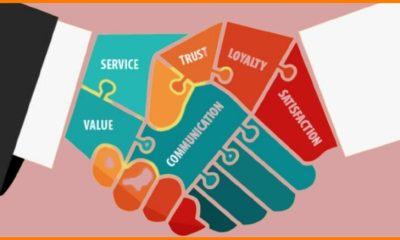Law
Lemon Law: The Definition and What it Means for You

Buying your first vehicle is an exciting yet confusing and stressful process. You just purchased a nice-looking car that drives great and even came with a warranty. A few weeks down the line, you start noticing some issues with the vehicle.
Taking the car back to the dealer makes it better for only a week, then it breaks down again. In such circumstances, there are lemon laws to protect consumers from purchasing “lemon cars.”
Do you understand the lemon law definition? What does it mean for you as a consumer? Our guide below will tell you everything you need to know about lemon laws.
Lemon Law Definition
What is the lemon law?
Lemon Laws are rules and regulations put in place by the government to protect a consumer if they buy defective and faulty products or services such as vehicles. Such faulty products are known as lemons, and they don’t meet their supposed usefulness or quality.
A lemon investment is a purchase that turns out to be worth less than it’s believed. Such investments are associated with financial fraud, economic factors, and poor money management skills.
Lemon Laws relate to defects and faults that impact the safety, value, or use of a car or a purchased product. The law states that if the manufacturer can’t successfully repair the vehicle after several tries, the manufacturer or seller should replace or repurchase it from the consumer.
Every U.S. state and the District of Columbia have enacted lemon laws at a state and federal level to target manufacturers who deliberately sell poor-quality and defective products to consumers.
The type of products covered by lemon laws differs depending on the jurisdiction. However, the law was initially meant for faulty automobiles sold to consumers. Lemon laws are also used to hold manufacturers accountable for the sensible execution of warranties.
Key Lemon Law Requirements
The lemon law doesn’t apply to every situation. Thus, there are different requirements for lemon laws to apply to you. If you’re unsure about your status, it’s best to contact an attorney for an evaluation of your case.
You can also call the 1 800 Lemon Law hotline to get an expert to assess your case. Below are essential lemon law requirements:
- The issues with your car must occur while it’s still under warranty
- The car has problems that make it unusable
- The manufacturer has tried to fix the vehicle numerous times without succeeding
- You haven’t used the car for at least 30 days because of the problems and repair attempts
- The vehicle developed issues within the first two years after purchase
Depending on your state, the court will determine how many times the manufacturer should attempt to fix the vehicle. Usually, it’s three to four times. Ensure you check out your state-specific lemon laws to understand the specific requirements.
Tips to Keep in Mind When Dealing With a Lemon Investment
Lemon laws differ from state to state. However, to get your lemon law buyback, you must follow below tips:
1. Always Take the Vehicle to the Dealership for Repairs
If your car is experiencing problems, ensure you only take it to the dealership you bought for repairs. This is essential if you want to be covered under a used or new car lemon law. Taking it to a different mechanic is a mistake as the manufacturer could shift blame.
2. Keep Receipts and a Record of All Repairs
In case your issue escalates to court, you will need detailed records of the repairs done. This record will be proof that the manufacturer had the opportunity to repair your vehicle properly but failed to do so. The court will also ask for evidence of how long you didn’t use your car because of the repairs.
3. Consider Hiring a Lemon Law Attorney
Most car manufacturers have attorneys who know how to navigate lemon law claims. Having an experienced lemon law attorney on your side could potentially impact the results of the case. If you win the case, the manufacturer will be responsible for the attorney’s fees.
What Is Lemon Law Buyback?
Lemon law buyback is when a car dealership or the manufacturer buys back your vehicle because it’s considered a lemon investment. The buyback includes all the money you spent when leasing or purchasing the lemon car. This consists of the initial down-payment and all other subsequent monthly payments you made.
The repurchase also includes a refund of your finance and tax charges and a percentage of the registration fee. However, the repurchase doesn’t include the usage fee, which is the value of the time you used the car without any issues.
A repurchase also covers any substantial and incidental expenses resulting from your lemon car. Such costs include towing and rental car expenses. Additionally, the manufacturer is also supposed to pay your loan balance on the vehicle in full.
Understanding How Lemon Laws Work
All states have varying lemon laws. These regulations cover new and used vehicle purchases under warranty and other product leases and purchases. The buyer has a limited time frame to report a lemon purchase.
The state and federal governments enacted lemon laws to prevent manufacturers from selling potentially unsafe and defective products.
At the beginning of the 20th century, a movement was formed to push the government to regulate goods sold to consumers. Thus the government enacted the 1975 Magnuson-Moss Warranty known as the Federal Lemon Law. This law, however, only covers products with a warranty.
Lemon Laws Will Give You the Protection You Deserve
When you buy a truck, motorcycle, or car with a warranty, you expect the manufacturer to effectively and efficiently fix any issues. However, if your vehicle is constantly at the repair shop for the same problem, contact an experienced lemon law attorney to help you get your money’s worth.
According to the lemon law definition above, the federal lemon law protects consumers like you from getting duped by manufacturers and car dealerships.
However, remember that lemon laws vary from state to state; thus, you should get a local attorney to handle your case. For more legal tips, check other posts on our website.
Law
Choosing the Right Will and Trusts Attorney for Your Estate Planning Needs


Understanding the Difference: Wills vs. Trusts
Decoding Wills: What You Need to Know
Wills are fundamental legal documents that dictate how an individual’s assets will be distributed upon their death. At their core, a will serves as a blueprint for an individual’s last wishes, ensuring that their belongings are passed on to the designated heirs or beneficiaries. It typically outlines who will inherit specific assets, who will manage the estate (the executor), and other stipulations such as guardianship provisions for minor children. A will only goes into effect after probate, a legal process that validates the will and oversees the distribution of assets under court supervision.
Importantly, the drafting of a will requires careful consideration of various factors including the specific language to be used, adherence to state laws, and the individual’s personal wishes and circumstances. Many people overlook the nuances of state probate laws, which can significantly impact how a will is executed and the timeline for asset distribution. This is why consulting with a will and trusts attorney is often essential, as they can provide guidance on minimizing legal complications and ensuring compliance with state requirements. Furthermore, a will is public record once it enters probate, which means the details of an estate can be accessed by anyone, raising concerns for individuals who may prioritize privacy over transparency.
Trusts Unveiled: More than Just a Safety Net
Trusts are often regarded as more versatile and dynamic than wills, offering a range of options for estate planning that can be tailored to meet specific financial and personal needs. A trust is a legal arrangement where a third party, known as a trustee, holds assets on behalf of beneficiaries. Trusts can be structured to take effect during and after the grantor’s lifetime, providing a means to manage estate assets in a way that a simple will cannot. One of the most significant advantages of a trust is that it allows for the direct transfer of assets to beneficiaries, bypassing the lengthy and often costly probate process, effectively keeping the estate private.
Different kinds of trusts serve distinct purposes; revocable living trusts can be altered or revoked during the grantor’s life, providing flexibility, while irrevocable trusts generally cannot be changed once established, but they offer powerful estate tax benefits. Additionally, certain trusts can mitigate tax liabilities, offer protection against creditors, or ensure that assets are managed responsibly for beneficiaries who may be minors or those who struggle with financial management. The breadth of options available within the realm of trusts is vast, allowing individuals to devise complex estate plans that can respond to changing life circumstances, financial markets, and personal goals more adeptly than a traditional will.
Choosing Between a Will and a Trust: Factors to Consider
The decision between creating a will and a trust involves multiple factors that individuals must assess based on their unique financial situations, family dynamics, and long-term goals. One of the first considerations is the size and complexity of the estate; larger estates with varied types of assets might warrant the creation of a trust to avoid probate and facilitate smoother asset distribution. Conversely, for those with smaller or more straightforward estates, a will may suffice.
Another essential factor is the level of control desired over asset distribution. Trusts can provide specific instructions on when and how beneficiaries receive their inheritance, which can be vital in cases where individuals wish to protect minors or provide for someone with special needs. If maintaining privacy is a paramount concern, trusts excel as they bypass the public nature of probate proceedings associated with wills. Additionally, tax implications and strategies for minimizing taxes on inheritance can make trusts more attractive for certain individuals.
Ultimately, the determination between a will and a trust is heavily influenced by personal circumstances, with many individuals opting for a combination of both to maximize the benefits and protections afforded by each legal instrument. Engaging with a seasoned estate planning attorney can significantly aid in navigating these considerations and developing a tailored approach that aligns with one’s specific estate planning objectives.
Key Qualities to Look for in Your Estate Planning Attorney
The Role of Experience: Why It Matters
When searching for an estate planning attorney, one of the foremost qualities to consider is experience. An attorney’s years of practice and their familiarity with estate planning nuances can significantly impact the quality and effectiveness of the estate plan created. They should possess a strong understanding of state-specific laws, tax implications, and the intricacies of both wills and trusts which vary considerably across jurisdictions. Experienced attorneys bring insights gleaned from past cases and can foresee potential pitfalls, ensuring that the estate plan stands robustly against challenges that may arise during its execution.
A deeper level of experience involves exposure to a diverse range of estate planning scenarios, from simple wills for individuals with modest estates to complex trust arrangements involving business interests, real estate holdings, and blended family dynamics. The attorney’s past cases can offer tangible evidence of their problem-solving capabilities and their approach to finalizing estate plans that ensure client wishes are honored while minimizing risks. Moreover, an attorney’s track record in handling probate or estate litigation can be invaluable should disputes arise after the passing of the individual, thereby underscoring the importance of selecting a knowledgeable and well-rounded practitioner in the field of estate law.
Communication Skills: Finding Your Ideal Advocate
Effective communication is critical in the relationship between you and your estate planning attorney. You should seek an attorney who can articulate complex legal concepts in a clear and understandable manner, allowing you to fully comprehend your options and make informed decisions. A good attorney will take the time to listen to your specific needs, concerns, and goals, ensuring that the estate plan reflects your unique wishes. They should provide reassurance as you navigate the sensitivities associated with estate planning decisions, often involving family dynamics and future uncertainties.
Additionally, inquire about their subsequent communication style and responsiveness to emails or phone calls, as a high level of accessibility can greatly enhance the overall experience. Establishing a rapport with your attorney can also foster an environment of trust, which is essential when discussing personal and often emotionally-charged topics such as inheritance, guardianship, and family legacies. Remember, the estate planning process is not about just completing a set of legal documents; it is about building a long-term relationship with a legal partner who will advocate for your best interests across any future circumstances.
Trustworthiness: Building a Solid Foundation
Trustworthiness is arguably one of the most vital qualities to seek in your estate planning attorney. Given the sensitive nature of estate planning, which often includes discussions regarding finances, personal relationships, and future intentions, finding a trustworthy attorney will allow you to feel secure in sharing such sensitive information. A trusted attorney should display integrity, transparency, and a genuine commitment to helping you achieve your goals.
Research their reputation within the community, beginning with reviews and testimonials from former clients, as well as recommendations from other professionals, such as financial advisors or tax consultants. Additionally, consider their standing within professional organizations or bar associations, as active involvement in the legal community can signal a commitment to ongoing education and ethical practice. Ultimately, the security of knowing that your estate planning attorney has the best interests of your family at heart and is dedicated to ensuring that your legacy is honored can provide immense peace of mind.
Questions to Ask During Your Initial Consultation
Unveiling Their Approach: Strategies for Your Estate
During your initial consultation with a potential estate planning attorney, it is essential to inquire about their approach to estate planning. Understanding their overarching strategies allows you to gauge if their philosophy aligns with your needs. Engage them on questions about how they tailor estate planning services to reflect individual client circumstances, the importance of flexibility within estate plans, and how proactive they are in anticipating changes to laws that may affect your estate.
It can also be beneficial to discuss their approach toward educating clients throughout the process. A quality attorney will ensure you understand every step of the estate planning journey, providing explanations of how each part of the plan fits into your overall wishes. Additionally, assess their methods for maintaining an ongoing relationship with their clients, as planning for the future is not a one-time task. Inquire about how they will modify your estate plan to adapt to changes in personal circumstances or new legal developments, ensuring that your plan continues to serve your family’s best interests effectively.
Understanding Fees: What’s Fair and What Isn’t
The cost of hiring an estate planning attorney is often a pivotal consideration. Different attorneys charge different fee structures; therefore, it is vital to discuss fees upfront during the initial consultation to avoid misunderstandings down the line. Common billing methods include hourly rates, flat fees for specific services, or retainers that cover various aspects of estate planning. Asking for a detailed breakdown of potential costs associated with the creation of wills, trusts, and other estate planning options can provide transparency into what you should expect.
In addition, understanding how long the process may take and any anticipated ongoing expenses related to asset management or modifications can alleviate future surprises. A fair attorney will be upfront about their fees, the value they provide, and will willingly share references for potential expenses based on various scenarios. Ultimately, the goal is to invest wisely in an attorney who provides both expertise and genuine service without subjecting you to unanticipated costs or complications.
Assessing Compatibility: Finding Your Perfect Match
Compatibility with your estate planning attorney is paramount; a positive rapport fosters collaboration and openness, which are critical in addressing sensitive estate matters. You should feel comfortable discussing intricate family dynamics or personal preferences without fear of judgment. Take the time to evaluate how well the attorney listens to your concerns, respects your values, and aligns with your vision of how your legacy should be managed.
Observing how they respond to your questions and how receptive they are to your insights can also offer a glimpse into their working style. An attorney who is genuinely interested in your perspective will be better equipped to create a comprehensive and thoughtful estate plan that resonates with your desires. Additionally, consider the attorney’s communication style—do they follow up with you in a timely manner, and do they make you feel valued as a client? Ensuring that all these elements align will contribute heavily to the effectiveness of your estate planning experience.
Navigating the Complexities of Estate Planning
Tax Implications: Avoiding Costly Mistakes
One of the trickiest aspects of estate planning is navigating the myriad tax implications that accompany asset transfer upon death. There are different tax responsibilities for estates, heirs, and trusts that can significantly impact the distribution and value of the assets left behind. Estate taxes, which can impact larger estates, require careful planning to minimize potential liabilities. Proper structuring through the use of trusts, gifts, or family limited partnerships can help mitigate exposure to these taxes.
Moreover, understanding the taxable assets within an estate, including real estate and investments, is essential. The key is to work with an attorney who can position your estate to take advantage of potential exclusions, deductions, and credits that can reduce the overall tax burden borne by heirs. Furthermore, be aware of state-level estate and inheritance taxes that can vary and can catch individuals by surprise if not accounted for properly. Proactive tax planning ensures that the wealth you intend to pass on to your heirs is preserved as much as possible, ultimately safeguarding their inheritance against unnecessary tax liabilities.
Updating Your Estate Plan: When and Why It’s Crucial
Estates are not static; they evolve as individuals and families encounter major life changes. Regularly reviewing and updating your estate plan is crucial to ensure that it remains aligned with your current circumstances and priorities. Key life events such as marriage, divorce, births, deaths, or significant financial changes should prompt a thorough reassessment of your estate documents. Additionally, major shifts in law or tax policy can also necessitate updates to an estate plan to safeguard against new liabilities or compliance issues.
Many individuals overlook the necessity of change until faced with the reality of probate or asset distribution challenges. Updated plans ensure the continuity of your intentions across a lifetime, allowing for proper asset management, alteration of beneficiaries, and amendments regarding guardianship for minors. Engaging with your estate planning attorney on a regular basis, or at least every few years, not only keeps your documents up to date but fosters ongoing dialogue that may uncover new strategies or considerations to enhance your estate plan further.
Common Pitfalls to Avoid: Lessons from Real Cases
As you embark on the estate planning journey, it is imperative to learn from the common pitfalls that have troubled others. One of the most frequent mistakes is failing to communicate your estate plan to your family members. Lack of transparency can lead to confusion, disputes, and in worst-case scenarios, prolonged litigation after your passing. Open discussions can promote understanding and prevent misunderstandings among family members regarding asset allocation and intentions.
Another common pitfall is neglecting to update beneficiary designations on assets such as life insurance policies, retirement accounts, or bank accounts after key life events. Designations generally supersede instructions left in wills or trusts; therefore, failing to keep them current creates potential for unintended distributions that may not align with your wishes.
Moreover, many individuals underestimate the complexity of estate taxes and the significant impacts they can have on the estate value and the inheritances left to heirs. Lack of comprehensive tax planning or strategic asset division can lead to unnecessary financial burdens on the beneficiaries. To avoid these pitfalls, consider seeking professional guidance from an estate planning attorney who can provide specific strategies on how to navigate the most common challenges faced and create a lasting plan that serves your family’s best interests long after you are gone.
Law
Legal Cash Advances: Bridging the Financial Gap Between Health Needs and Justice


When an accident lands you in both the emergency room and a courtroom, the medical bills can pile up long before a settlement check ever arrives. That delay isn’t just a numbers game—it has real-world consequences for your well-being. Mounting research links financial strain to higher risks of anxiety, chronic disease flare-ups, and delays in necessary care. In other words, the money you need to stay healthy often arrives after health has already taken a hit. That’s where legal cash advances step in, offering plaintiffs a lifeline that keeps medical and everyday expenses on track while a lawsuit runs its course.
What Exactly Is a Legal Cash Advance?
A legal cash advance—sometimes called pre-settlement funding—is a non-recourse advance offered to plaintiffs with a pending personal injury or similar claim. Because repayment is contingent on winning or settling the case, it differs from a traditional loan: if the case is unsuccessful, the advance typically does not have to be repaid. The American Bar Association notes that consumer-focused litigation funding is usually capped at relatively modest amounts and is designed to cover day-to-day living or treatment costs rather than bankroll an entire trial strategy.
Why Financial Stress Is a Health Issue
It’s easy to treat money and medicine as separate concerns, yet public health data tells another story. The Centers for Disease Control and Prevention reports that 90 percent of the nation’s $4.5 trillion annual health-care spend relates to chronic and mental health conditions—conditions that are aggravated by stress. Stress hormones such as cortisol can disrupt sleep, raise blood pressure, and weaken the immune response, creating a vicious cycle in which unresolved medical bills exacerbate illness, and worsening illness amplifies costs.
The Real-World Cost of Waiting for a Settlement
Even a short gap between injury and compensation can destabilize a household budget. According to the CDC’s National Health Interview Survey, nearly one in ten U.S. adults lives in a family that has struggled to pay medical bills during the previous 12 months, with higher percentages among those already managing disabilities. For plaintiffs, the situation is often more acute: regular income may dip due to lost work hours, while co-pays, physical therapy, and prescription expenses spike.
How a Cash Advance Supports Ongoing Care
Here’s where a legal cash advance becomes more than a financial tool—it can be a health-preserving measure:
- Continuity of treatment– Plaintiffs can afford recommended follow-up visits, diagnostic imaging, or prescription refills instead of postponing care until “after the settlement.”
- Reduced cost-related non-adherence– Studies show that people under financial pressure are more likely to skip doses or self-ration medication. Access to immediate funds helps prevent that risky behavior.
- Mental-health relief– Knowing that rent and utility payments are covered lightens the cognitive load, letting you focus on physical recovery and the legal process, not late fees.
A Deeper Look at Plaintiff Advantages
For readers who want to unpack how plaintiffs specifically benefit, beyond the medical angle, take a look at an in-depth exploration of the key plaintiff advantages offered by legal cash advances. You’ll find a detailed breakdown of fee structures, approval timelines, and risk considerations that complement the health-centered discussion here.
Due Diligence: Choosing a Reputable Funder
Not every funding offer is equal, and the wrong terms can undercut the very relief you’re seeking. Consider these checkpoints:
- Transparent pricing– Look for a clear, flat fee or interest schedule, laid out in plain English.
- Independent legal counsel– Ethical funders encourage your attorney to review the contract.
- No control over litigation strategy– As emphasized by ABA guidance, funding companies should not direct your attorney’s decisions.
Ask questions, read the fine print, and be wary of pressure tactics. A short-term fix that balloons into an oversized payoff can negate health and financial gains.
Potential Trade-Offs and How to Manage Them
Every financial tool carries downsides. Fees can be higher than conventional credit, and stacking multiple advances magnifies repayment obligations. Talk openly with your lawyer about realistic settlement ranges, how much of that amount a funder has first claim to, and what your net recovery might look like before signing anything. If the numbers no longer cover medical follow-up or household recovery, a smaller advance—or none at all—may be the healthier choice.
The Bigger Picture: Health, Justice, and Financial Stability
Legal cash advances aren’t a magic wand, but they do narrow the dangerous gap between injury-related expenses and eventual compensation. By easing cash-flow crunches, they help plaintiffs avoid treatment delays, medication lapses, and the stress spirals that chip away at recovery. That synergy between financial stability and health outcomes is why pre-settlement funding has become a recurring topic in both legal and public health circles.
When weighing your own options, ground the decision in credible data, a candid budget review, and professional legal advice. Do that, and a well-structured advance can serve as one more tool, alongside physical therapy sessions and follow-up lab work, on the road to reclaiming both health and financial peace of mind.
Read More: Jessica Ditzel
Law
A Detailed Overview of the Litigation Process


Litigation is the formal legal process used to resolve disputes between individuals, businesses, or other entities. This process plays a crucial role in ensuring justice in cases such as personal injury claims, contract disputes, and divorce proceedings.
If you are interested in Litigation Crowdfunding, check this read Litigation Crowdfunding: Do’s and Don’ts — 8 Tips to Maximize Success
Civil Litigation and Court Jurisdiction
Civil litigation can occur in either state or federal courts, depending on the nature of the dispute. In the United States, the Federal Rules of Civil Procedure govern cases in federal courts, aiming to provide a just, speedy, and cost-effective resolution for all involved parties.
The Litigation Process
While the specifics of litigation can vary by jurisdiction, the general process follows these key steps:
1. Filing a Complaint
When the plaintiff formally submits a claim to the court, describing the disagreement and the legal foundation for their position, the procedure officially starts. After that, the court notifies the defendant about the lawsuit through papers.
2. Pre-Trial Motions and Discovery
Motions may be submitted by any party asking the judge to render particular decisions. Typical motions consist of: A motion to compel discovery asks the court to mandate that the other party provide crucial information; A motion for summary judgment is a proposal to settle a case without a full trial when one side is legally entitled to win and the facts are undeniable.
The next step is the discovery phase, during which both parties collect evidence, share documents, and conduct depositions in order to strengthen their views.
3. Trial Proceedings
The case goes to trial if it is not dismissed or settled. Both sides offer arguments and supporting documentation during the trial.
Witnesses may be cross-examined and called to testify.
The burden of proving claims, such as proving negligence in a personal injury case, usually rests with the plaintiff.
4. Verdict and Judgment
The verdict of the case is decided by a jury or a judge. The right to a jury trial is guaranteed by the U.S. Constitution if the plaintiff seeks monetary damages over $20, unless all parties agree to forgo this right. A judge typically renders a decision in cases involving non-monetary remedy, like an injunction.
5. Appeals and Enforcement
A party may file an appeal with a higher court to request a reconsideration of the decision if they are unhappy with it. The verdict is implemented through the judicial system if the appeal is denied.
Arbitration: An Alternative to Litigation
Arbitration is a form of alternative conflict resolution that is useful for people who want to avoid drawn-out and expensive court cases. An unbiased arbiter considers the matter and renders a binding ruling in lieu of a trial, which frequently results in a quicker and more economical resolution.
The Problem of Frivolous Litigation
Although frivolous lawsuits—cases brought with little legal basis, frequently as part of class actions or mass tort claims aiming at financial gain—have become a burden on the litigation system, which is meant to settle legitimate issues. These cases can cost defendants a lot of money, take years to conclude, and deplete the court’s resources. Resolving this issue is essential to preserving a just and effective judicial system.
One essential method for settling conflicts and defending legal rights is still litigation. Businesses and people can successfully manage legal disputes by being aware of the procedure, available options such as arbitration, and the difficulties presented by pointless litigation. Being well-informed is essential to getting the best result whether filing a lawsuit or defending against one.
Resource:https://instituteforlegalreform.com/blog/what-is-litigation/
Read More: jacqulyn elizabeth hanley
-



 Biography7 years ago
Biography7 years agoJacqulyn Elizabeth Hanley is the Mother of Liza Soberano?
-



 Biography7 years ago
Biography7 years agoAmanda Levy Mckeehan Biography, Family, Net Worth, Age, Affairs, Facts
-



 Home6 years ago
Home6 years agoEpson L3110 Driver Free Download Latest Updated Version
-



 Games5 years ago
Games5 years agoBest Free To Play MMORPG To Try This 2021
-



 Biography7 years ago
Biography7 years agoWho is Rose Dorothy Dauriac? Scarlett Johansson Daughter?
-



 Home7 years ago
Home7 years agoLiza Soberano Biography, Age, Family and Boyfriends
-



 Biography7 years ago
Biography7 years agoJessica Ditzel Secret Information that Nobody Knows | Joe Rogan’s Wife
-



 Biography7 years ago
Biography7 years agoWhat is the relation of Nathaniel Larry Osorno with Liza Soberano?































